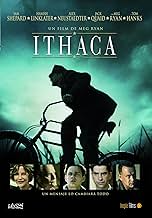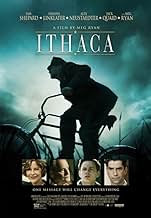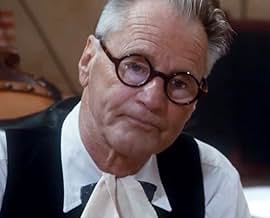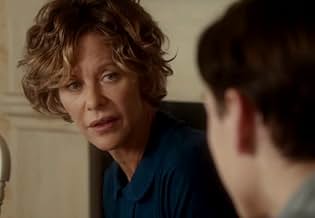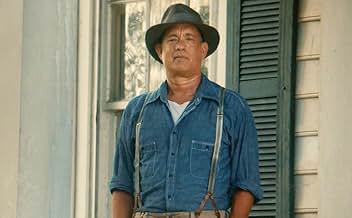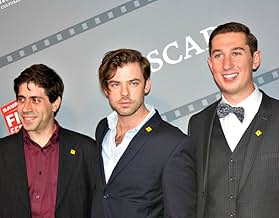VALUTAZIONE IMDb
5,5/10
3271
LA TUA VALUTAZIONE
Con il fratello maggiore in partenza per la guerra, il quattordicenne messaggero telegrafico, Homer Macauley, diventa maggiorenne nell'estate del 1942.Con il fratello maggiore in partenza per la guerra, il quattordicenne messaggero telegrafico, Homer Macauley, diventa maggiorenne nell'estate del 1942.Con il fratello maggiore in partenza per la guerra, il quattordicenne messaggero telegrafico, Homer Macauley, diventa maggiorenne nell'estate del 1942.
- Premi
- 2 candidature totali
Recensioni in evidenza
7Nozz
After World War II, William Saroyan gambled away all his money but he preferred to resort to hack work rather than sell movie rights to any of his novels. Not after his disappointment with the original movie of The Human Comedy. Part of it was vanity. He'd wanted to direct the movie, and MGM wouldn't let him. But it's also true that Hollywood has its own point of view and it doesn't always match Saroyan's.
In Ithaca, which is a remake of the Human Comedy (now that Saroyan is dead), the main story and characters are preserved, but to me it doesn't look like Saroyan. In the book's classic illustrations by Don Freeman, Mrs. Macauley is older-looking and certainly not an attractive but obvious plastic-surgery veteran like Meg Ryan. Grogan is older-looking too. The character brought most successfully to the screen is Ulysses, although he shouldn't be losing his baby teeth if, as the dialog says, he's four. He's remarkable.
The visuals are, to my taste, too expressionistic. The telegraph office is huge, the roads are wide, and things are too big in general except where Marcus the faraway soldier is involved. All the scenes with Marcus are crowded. That does emphasize the contrast between Ithaca and where Marcus is, but Marcus is not remote enough. Because there are continual voice-overs from his letters, I think the audience doesn't appreciate his absence as a factor. Even the dead father isn't completely absent, and although he adds a sorrowful note, this unkillable family togetherness diminishes the philosophical message that our human condition is one of loneliness and we must actively reach out.
On the one hand, I expected a dustier, less prosperous-looking Ithaca. On the other hand, I was surprised that the choice of music verged on primitivity. More Appalachian than Californian.
I think that a more realistic movie might have worked better, because of the need to carry some dialogue that can, if not handled right, sound unrealistically divorced from what everyday people really say. People declaiming unrealistic-sounding dialogue amidst unrealistic-looking scenery may be fine for the stage but it's difficult to sell on the screen.
Still, the movie tries to be respectful of the original. It even includes some salutes to matters that only readers of the book will fully appreciate-- such a mention of unripe apples, referencing a whole episode involving unripe apricots in the book. I hope that since Saroyan is no longer alive to object, Hollywood will continue to mine his canon.
In Ithaca, which is a remake of the Human Comedy (now that Saroyan is dead), the main story and characters are preserved, but to me it doesn't look like Saroyan. In the book's classic illustrations by Don Freeman, Mrs. Macauley is older-looking and certainly not an attractive but obvious plastic-surgery veteran like Meg Ryan. Grogan is older-looking too. The character brought most successfully to the screen is Ulysses, although he shouldn't be losing his baby teeth if, as the dialog says, he's four. He's remarkable.
The visuals are, to my taste, too expressionistic. The telegraph office is huge, the roads are wide, and things are too big in general except where Marcus the faraway soldier is involved. All the scenes with Marcus are crowded. That does emphasize the contrast between Ithaca and where Marcus is, but Marcus is not remote enough. Because there are continual voice-overs from his letters, I think the audience doesn't appreciate his absence as a factor. Even the dead father isn't completely absent, and although he adds a sorrowful note, this unkillable family togetherness diminishes the philosophical message that our human condition is one of loneliness and we must actively reach out.
On the one hand, I expected a dustier, less prosperous-looking Ithaca. On the other hand, I was surprised that the choice of music verged on primitivity. More Appalachian than Californian.
I think that a more realistic movie might have worked better, because of the need to carry some dialogue that can, if not handled right, sound unrealistically divorced from what everyday people really say. People declaiming unrealistic-sounding dialogue amidst unrealistic-looking scenery may be fine for the stage but it's difficult to sell on the screen.
Still, the movie tries to be respectful of the original. It even includes some salutes to matters that only readers of the book will fully appreciate-- such a mention of unripe apples, referencing a whole episode involving unripe apricots in the book. I hope that since Saroyan is no longer alive to object, Hollywood will continue to mine his canon.
I would caution the reader to not take too much stock in the less- than-stellar, Monday morning director, critical reviews of this film. Tom Hanks' position in the billing should be the very last, if even noted. His face time in this movie is probably less than 2 minutes total and, for all intents and purposes, Meg Ryan's character is minor. Any decent character actress could have played her role without any impact on the motion picture as a whole. This is not "Sleepless In Seattle" nor is it a spin-off of any other Meg Ryan or Tom Hanks movie. These two "box office draws" are in this motion picture because as producer (Hanks) and director (Ryan) they chose to be; perhaps for the purpose of giving this film initial gravitas or simply because they wanted to be participants in the telling of a good story and a good story this is.
This is a time-period piece conceived by William Saroyan in 1942 and published as the novel, "The Human Comedy" in 1943. Everything about this film is 1942 perhaps with the exception of the lack of recognizable, vintage 1940's music. This is a film depicting the morals and values of small town America at the beginning of the Second World War, not the values, morals, or expectations of those of us trapped so much in the present that we cannot recognize or even acknowledge the simple and far more innocent times portrayed in this film. Consequently, the gratuitous profanity so common in pictures today is refreshingly absent. This was a time when to be able to kiss a cute girl on her cheek was considered something very special to a young man heading off to war. It was a time when a little boy could get lost in town and the only real threat was that he might miss dinner. People did not lock their doors. A telegraph messenger, even though a stranger, was invited into one's home. If a person was involved in a nefarious or unseemly behavior they did their best to hide it. It was a time when a typical 14 year-old boy, like Homer Macauley (Alex Neustaedter), having experienced the Great Depression first hand, was already a responsible individual.
This was the world in which Homer rode his bicycle, delivering telegrams, picking up night letters, and doing everything he could to see that the Postal Telegraph Company could effectively compete with Western Union; all the while being the one remaining "man of the house" in the wake of his father's untimely death and his older brother's departure for service overseas. Ithaca and the nation were slowly adjusting to war as the patriotic zeal following Pearl Harbor gave way to the more sobering realities of life during wartime. The presence of a telegraph messenger at the front door was not yet perceived as a sign of bad news but those in the telegraph business, transmitting, decoding, and delivering the messages, were becoming keenly aware of the war's growing, painful impact on families. In this context, with the war's presence being increasingly felt and experienced, the small day-to-day aspects of community were the constants, giving the character of Homer's 4-year old brother, Ulysses (Spencer Howell), the unique ability to provide an endearing presence of those things that are ultimately important and reminding us that, even when things appear to be going so very badly, life is good and must go on.
Screenwriter Erik Jendresen says in his synopsis of the story line, "this is a coming-of-age story." In my view it is far more than that if, in watching the film, one will allow being transported to Ithaca, NY in 1942 and to embrace for 90 minutes or so, the values of the people living through this story at that time.
This is a time-period piece conceived by William Saroyan in 1942 and published as the novel, "The Human Comedy" in 1943. Everything about this film is 1942 perhaps with the exception of the lack of recognizable, vintage 1940's music. This is a film depicting the morals and values of small town America at the beginning of the Second World War, not the values, morals, or expectations of those of us trapped so much in the present that we cannot recognize or even acknowledge the simple and far more innocent times portrayed in this film. Consequently, the gratuitous profanity so common in pictures today is refreshingly absent. This was a time when to be able to kiss a cute girl on her cheek was considered something very special to a young man heading off to war. It was a time when a little boy could get lost in town and the only real threat was that he might miss dinner. People did not lock their doors. A telegraph messenger, even though a stranger, was invited into one's home. If a person was involved in a nefarious or unseemly behavior they did their best to hide it. It was a time when a typical 14 year-old boy, like Homer Macauley (Alex Neustaedter), having experienced the Great Depression first hand, was already a responsible individual.
This was the world in which Homer rode his bicycle, delivering telegrams, picking up night letters, and doing everything he could to see that the Postal Telegraph Company could effectively compete with Western Union; all the while being the one remaining "man of the house" in the wake of his father's untimely death and his older brother's departure for service overseas. Ithaca and the nation were slowly adjusting to war as the patriotic zeal following Pearl Harbor gave way to the more sobering realities of life during wartime. The presence of a telegraph messenger at the front door was not yet perceived as a sign of bad news but those in the telegraph business, transmitting, decoding, and delivering the messages, were becoming keenly aware of the war's growing, painful impact on families. In this context, with the war's presence being increasingly felt and experienced, the small day-to-day aspects of community were the constants, giving the character of Homer's 4-year old brother, Ulysses (Spencer Howell), the unique ability to provide an endearing presence of those things that are ultimately important and reminding us that, even when things appear to be going so very badly, life is good and must go on.
Screenwriter Erik Jendresen says in his synopsis of the story line, "this is a coming-of-age story." In my view it is far more than that if, in watching the film, one will allow being transported to Ithaca, NY in 1942 and to embrace for 90 minutes or so, the values of the people living through this story at that time.
It shows the innocence of a younger son, an older son grown up, and a middle son Homer becoming aware of what real life is as he delivers telegrams to the mothers of sons who will not be coming back home from the war alive. Homer grows up as he sees the pain of life.
An old man named Will Grogan receives and types the telegrams. Mr. Grogan drinks to help deal with his pain of sending this information to families in the community.
The movie shows us how war may effect us. It makes you realize the front line of war can be just as difficult at home as they try to continue with life.
An old man named Will Grogan receives and types the telegrams. Mr. Grogan drinks to help deal with his pain of sending this information to families in the community.
The movie shows us how war may effect us. It makes you realize the front line of war can be just as difficult at home as they try to continue with life.
"I don't know what's ahead, but whatever it is I am humbly ready for it." Homer Macauley (Neustaedter) has just watched his brother go off to fight in WWII and wants to do anything he can to help. He decides the best way for him to help his family is to get a job. He decides to become a bicycle telegraph messenger, and sets out to be the best and fastest one anyone has ever seen. Soon after he begins he is given a message that changes everything, and his job becomes more important than he ever imagined. This is a movie that I am very torn about. On one hand the movie has tremendous heart and leaves you hoping the movie won't end the way you expect it to. The acting is great and this is a very good character study of how the war affected the relatives stateside. On the other hand, you have a prediction on how the movie will end and you are just waiting for it to come to fruition. The fact that you think this way distracts you from the movie and the emotion of every other aspect seems to be lost and glossed over. I didn't think the movie was that bad and it is worth seeing, but about a year ago a movie called Little Boy came out and that was far better than this one. Overall, a good movie that is worth seeing, but you spend the entire time waiting for one thing to happen and it ultimately distracts you from the rest of the movie. I give this a B-.
It is good to see that there is movies made not for sale. Movies that bring some meaning and help to think. My English is poor so I cant good express myself, but I hope main point is clear. This movie will make you think,will leave something after to think about. And it is much deeper that it looks at the first time. War is big problem, and it is still actual , right now there is so many fights, pain, destroyed families, and people avoid to think about it. It is not fun, it is not comfortable, it is better pretend that its not exist. Thats why I think this kind of films will make word a bit better. Thanks to everyone who invested to this film.
Lo sapevi?
- BlooperWhen they are in the cinema watching the newsreel, there's a shot of a man carrying a wounded solider across a river. The commentary states "when this country was extending a helping hand."
That shot is actually of an Australian soldier helping a wounded Australian in the Kokoda campaign in New Guinea. The film is footage from Kokoda Front Line, by Damian Parer, who was an Australian combat camera man.
- Citazioni
Mrs. Macauley: There will always be pain in this world, Homer. And a good man will seek to take the pain out of things.
I più visti
Accedi per valutare e creare un elenco di titoli salvati per ottenere consigli personalizzati
- How long is Ithaca?Powered by Alexa
Dettagli
- Data di uscita
- Paese di origine
- Sito ufficiale
- Lingua
- Celebre anche come
- Thành Phố Ithaca
- Luoghi delle riprese
- Aziende produttrici
- Vedi altri crediti dell’azienda su IMDbPro
Botteghino
- Budget
- 5.000.000 USD (previsto)
- Tempo di esecuzione1 ora 36 minuti
- Colore
- Proporzioni
- 2.35 : 1
Contribuisci a questa pagina
Suggerisci una modifica o aggiungi i contenuti mancanti



